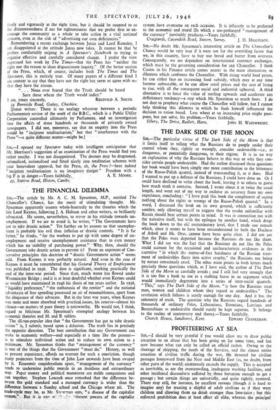THE DARK SIDE OF THE MOON
Sm,—The particular virtue of The Dark Side of the. Moon is that it limits itself to telling what the Russians do to people under their control whom they, rightly or wrongly, consider undesirable—i.e., as dangerous, or potentially dangerous, to their regime. It is in no way an explanation of why the Russians behave in this way or why they con- sider certain people undesirable. Had the author discussed these questions her book would have been simply one more contribution to the bitterness of the Russo-Polish quarrel, instead of transcending it, as it does. Had I wanted to put up a defence of the Russians, I could have done so. Or I could have declined to write about the book, leaving it to others to guess how much truth it contains. Instead, I wrote about it at twice the usual length, and went out of my way to endorse its accuracy from my own experience, concluding:. " I have paid this book the compliment of saying nothing about the rights or wrongs of the-Russo-Polish quarrel." In a word, I discussed the book on its own ground, which is sufficiently sombre, only allowing myself to suggest that the reader unfamiliar with Russiaishould bear certain points in mind. It was in connection not with the narrative itself, but with the epilogue by another hand, which drags the book down to the old recriminatory level, that I made one remark which, since it seems to have been misunderstood by both the Duchess of Atholl and Mr. Oras, cannot have been quite clear. ,I did not say that the Poles were deported because the Russians do not like them. What I did say was the fact that the Russians do not like the Poles could account for the, occasional and uncharacteristic evidences in the narrative " in which the matter-of-fact harshness of the Russian treat- ment of undesirables flares into active cruelty," the Russians not being by nature consciously cruel. The other main points in both letters touch precisely those questions which, as I have said, the author of The Dark Side of the Moon so carefully avoids • and I still feel very strongly that it is too fine a book to use as a stalking horse in an argument which would immediately degenerate into a series of inter-racial quarrels. "This," says The Dark Side of the Moon, " is how the Russians treat men, women and children whom they regard as undesirables." The revelation which follows is surely enough for one day. And it has the solemnity of truth. The question why the Russians regard hundreds of thousands of ordinary Poles, Lithuanians, Estonians, Latvians and Bessarabians as undesirable should surely be kept separate. It belongs to the realms of controversy and theory.—Yours faithfully,






























 Previous page
Previous page